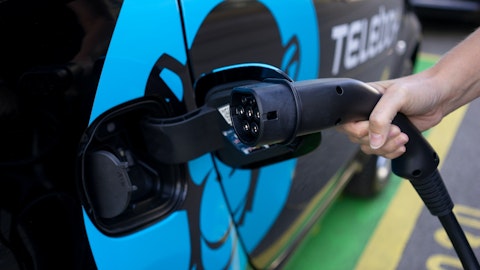Tony Guglielmin: It’s Tony and Sameer, I just want to – I will just add a little color, too. Certainly, over the last 12 months, 18 months, supply chain has been an issue. Cost price has been an issue. Some of those supply chain pressures, some of them continue to exist, but that’s starting to alleviate somewhat. I think to the other point that I would want to make, and I hit it, I kind of commented in my highlights, the two big priorities for the company in the near-term. One, of course, is the Volvo – getting the Volvo JV closed, as I mentioned. And the other one is improving the financial performance and margins. There is a discipline needed. While we are certainly seeing good revenue growth, we are not going to be – we are not and never were chasing revenue at the expense of margin.
But Bill, I got to say, Bill and his team have done a great job of instilling and changing a bit the discipline around pricing in terms of ensuring that we are working with our customers, but ensuring that we can push through as much of the price pressure we have seen. And that’s really, frankly, has had as much as the biggest impact, including mix, but also the biggest impact in the last year has been on having some hard conversations with customers. And I can say that we are starting to see the benefit, and we will continue to do so. But having said that, there has been a bit of an alleviation on the supply chain. And as Bill said, we are taking some cab taking steps and we will take steps to further improve our manufacturing footprint and efficiency, which will help gross margin as well.
Sameer Joshi: Thanks for that color, Tony. Just staying on the cost front, I think maybe I missed it, but was there anything – more details given on what level of savings to expect from the India JV sort of reduced responsibilities in terms of dollars? And when should we see that impact by 2Q of next year, 3Q of next year? Impact or benefit, I should say.
Bill Larkin: I will take that and then I can let you chime in Tony is we haven’t – we didn’t put out specific dollar amounts. It’s – we have had a long relationship with our partner. And looking at the new market is a very attractive market. We have got a great partner there. And we looked at how do we address the market to take advantage of the growth opportunity. And hence, we did the restructuring and our relationship with Minda to take advantage of that and the leverage, which will help improve our cash flows. And that’s essentially going to – I think we will start seeing some benefit in Q4, but we will – we will start seeing the true benefits next year in that new relationship.
Sameer Joshi: Got it. And just one last one maybe, I know the delay from November to January ‘24 is not a significant delay, but is there any reason for that? And how – what is the level of confidence that in January, the LPG systems or Euro 6 will start production?
Bill Larkin: Yes. It’s – for surprise me. It happens all the time. It is a two-month delay. It’s just trying to get production up and running, trying to do all the validation. It just takes time to get through that process. So, I don’t have any concerns here with the short delay and have a lot of confidence that we will start delivering the components to our OEM partner early next year.
Sameer Joshi: Got it. Thanks. That’s all for me. Good luck.
Operator: Thank you. Our next question comes from Rob Brown from Lake Street Capital Markets. Please go ahead. Your line is open.
Rob Brown: Good morning.
Tony Guglielmin: Good morning Rob.
Rob Brown: On the heavy-duty OEM business, you have got the model changeover, you have got kind of the improved feeling the price spread environment. Just wanted to get a sense of how you see that and maybe in terms of market share gains or penetration gains into next year. How do you see that kind of turning around, any sense on the direction there?



